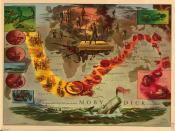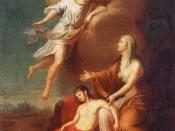Moby Dick begins with the narrator's statement: "Call me Ishmael." The statement communicates the narrator's feelings of identity with the biblical Ishmael, Abraham's son with Hagar. After Sarah, Abraham's legitimate wife, gave birth to Isaac, Ishmael was disinherited in favor of his younger half-brother, and renounced by his father. He and his mother were thrown out of the family home, forced to live in wilderness and provide for themselves anyway they could. Therefore, the very name "Ishmael" became a synonym for an exile, an outcast.
The Ishmael from Moby Dick (an exile and an outcast) begins his journey because he feels "a damp drizzly November" in his soul. Traveling around is his "way of driving off the spleen and regulating the circulation." His suicidal impulses make him pause in from of coffin warehouses. His bitterness and anger with the world make him feel like stepping out into the street and "methodically knocking people's hats off":
Ishmael is a discontented and rebellious exile, just like the pioneers and conquerors of the Wild West.
The same discontent that made those pioneers set off to conquer the great wide open spaces, made Ishmael go to sea.
The people who conquered the new frontiers of America were all Ishmaels: dissatisfied outcasts forced to survive in the wilderness. Out of the confrontation with the wilderness came a new type of hero: courageous, tough, self-reliant, experienced, skilled, in contact with life at its most basic elements; and above all restless, full of nervous energy and rebellious individualism.
The following lines, written by Captain John Smith describe in the best way the making of a new myth, American myth with its new, American hero: "It is a happy thing to be born to strength, wealth, and honor; but that which is got by prowess is...


